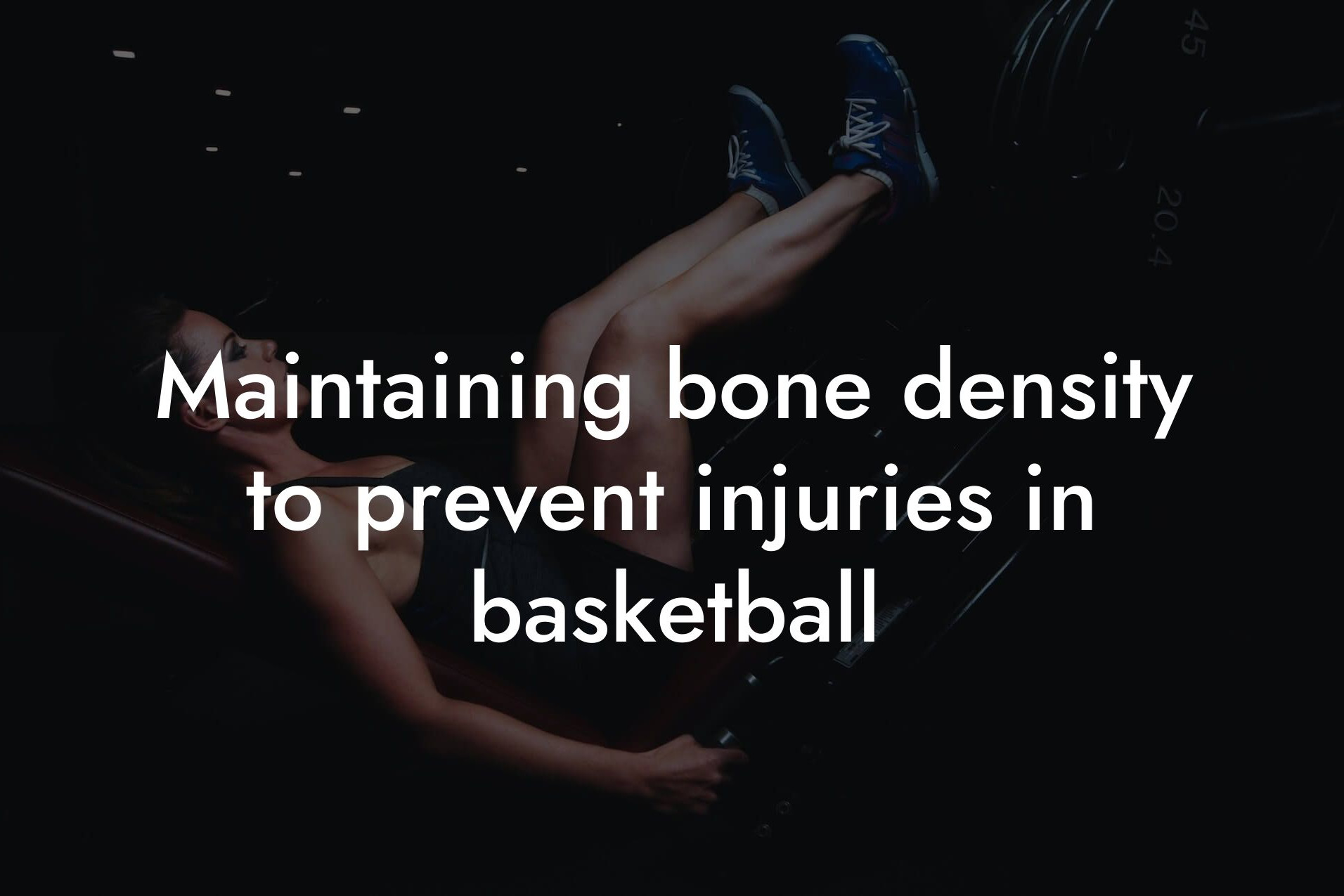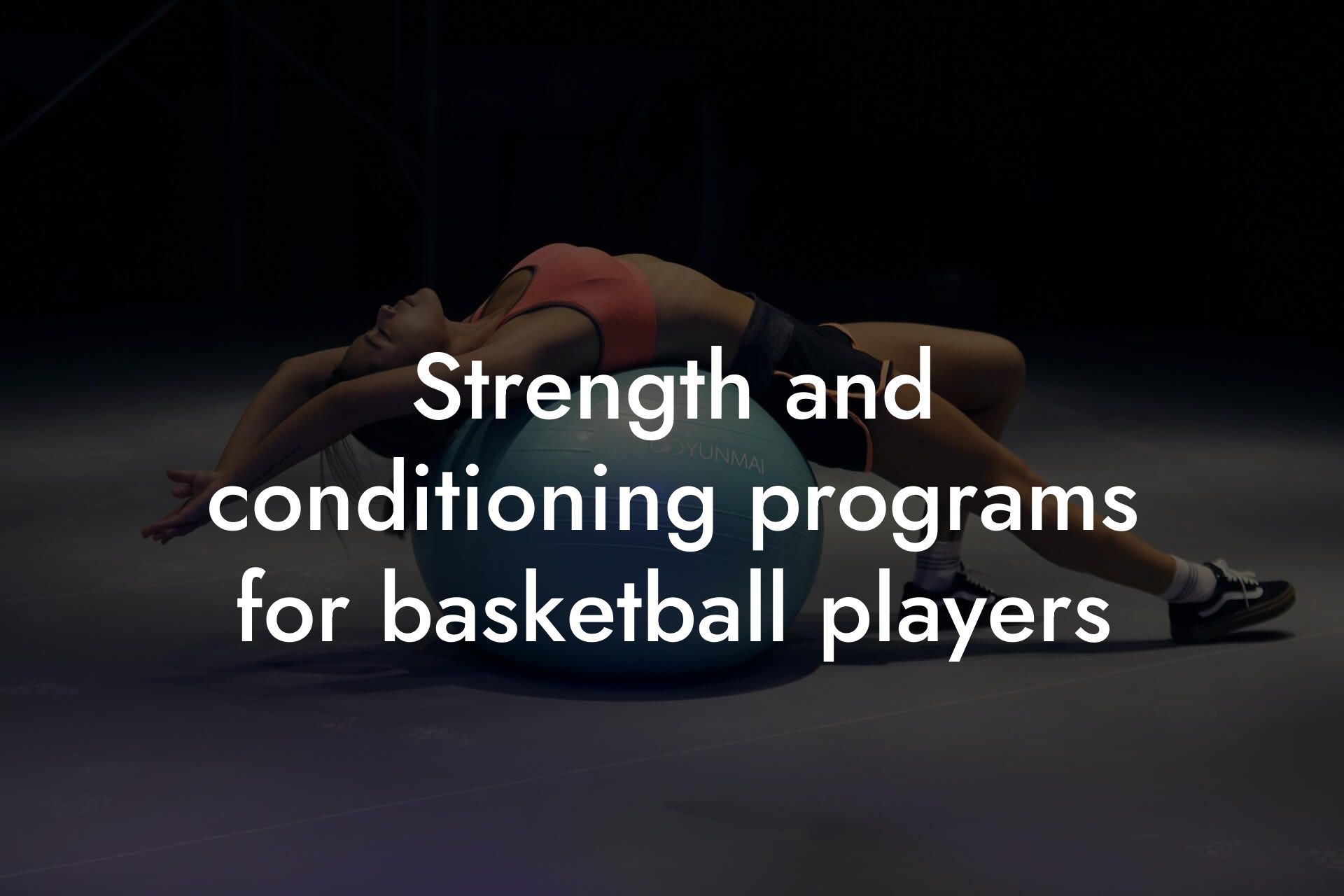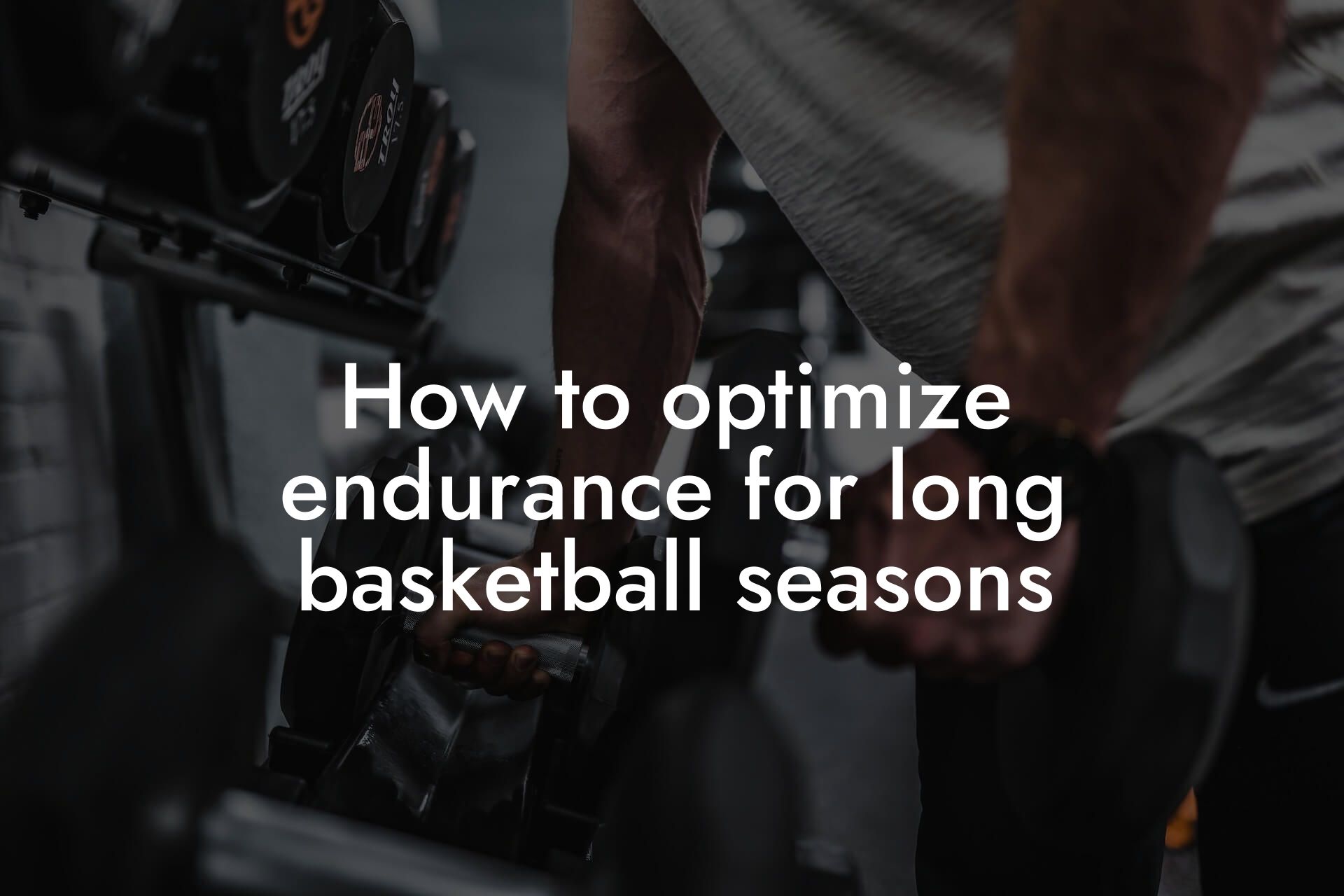As a high-earning professional, you understand the importance of maintaining peak physical performance to excel in your career and personal life. As a basketball enthusiast, you know that sustaining energy throughout a game is crucial to outperform your opponents and achieve victory. At Tano Performance Group, we're committed to providing you with the essential nutrition tips to optimize your energy levels and take your game to the next level.
Table of Contents
- Pre-Game Nutrition: Setting the Foundation
- Carbohydrates: The Primary Energy Source
- Protein: Building and Repairing Muscle
- Healthy Fats: Supporting Energy Production
- Hydration: The Key to Optimal Performance
- In-Game Snacks: Boosting Energy
- Post-Game Nutrition: Recovery and Rebuilding
- Individualized Nutrition Planning
- Frequently Asked Questions
Pre-Game Nutrition: Setting the Foundation
A well-planned pre-game meal is critical to ensure you have the energy to power through the entire game. Aim to eat a balanced meal 2-3 hours before the game, consisting of complex carbohydrates, lean protein, and healthy fats. This meal should provide sustained energy, support muscle function, and aid in hydration. Good examples of pre-game meals include:
- Grilled chicken breast with brown rice and steamed vegetables
- Whole-grain pasta with lean ground beef and marinara sauce
- Omelette with whole-grain toast and mixed berries
Additionally, make sure to stay hydrated by drinking plenty of water or a sports drink 1-2 hours before the game. Aim to consume 17-20 ounces of fluid for every pound of body weight lost during exercise.
Carbohydrates: The Primary Energy Source
Carbohydrates are the primary source of energy for basketball players. Focus on complex carbohydrates, such as whole grains, fruits, and vegetables, which provide sustained energy and fiber. Aim to consume 2-3 grams of carbohydrates per kilogram of body weight 1-2 hours before the game. Good sources of complex carbohydrates include:
- Whole-grain bread and cereals
- Fruits like bananas, apples, and berries
- Vegetables like sweet potatoes, carrots, and broccoli
Protein: Building and Repairing Muscle
Protein is essential for building and repairing muscle tissue. As a basketball player, you need protein to support muscle function and recovery. Aim to consume 15-20 grams of protein 1-2 hours before the game. Good sources of protein include:
- Lean meats like chicken, turkey, and fish
- Eggs and dairy products
- Legumes like lentils, chickpeas, and black beans
Healthy Fats: Supporting Energy Production
Healthy fats are essential for energy production and can help sustain energy levels during the game. Focus on unsaturated fats, such as avocado, nuts, and seeds. Aim to consume 0.5-1 gram of healthy fats per kilogram of body weight 1-2 hours before the game.
Hydration: The Key to Optimal Performance
Proper hydration is critical to optimal performance during basketball games. Aim to drink 17-20 ounces of fluid for every pound of body weight lost during exercise. You can monitor your hydration levels by checking the color of your urine – it should be pale yellow or clear. Additionally, make sure to drink water or a sports drink during timeouts and halftime to replenish lost electrolytes.
In-Game Snacks: Boosting Energy
In-game snacks can provide a quick energy boost to help you power through the game. Opt for snacks that are high in carbohydrates and electrolytes, such as:
- Bananas or apples
- Energy bars or chews
- Sports drinks or coconut water
Aim to consume 30-60 grams of carbohydrates during each quarter, depending on your individual energy needs.
Post-Game Nutrition: Recovery and Rebuilding
After the game, it's essential to refuel and replenish energy stores to aid in recovery and rebuilding. Aim to consume a meal or snack that includes carbohydrates and protein within 30-60 minutes after the game. This meal should help repair muscle tissue, replenish energy stores, and support immune function. Good examples of post-game meals include:
- Chocolate milk and whole-grain crackers
- Greek yogurt with mixed berries and honey
- Grilled chicken breast with sweet potato and steamed broccoli
Individualized Nutrition Planning
Every basketball player is unique, with different energy needs and dietary requirements. At Tano Performance Group, we understand the importance of individualized nutrition planning. Our team of experts can help you develop a personalized nutrition plan tailored to your specific needs and goals. By leveraging our advanced DEXA technology, we can provide you with a comprehensive body assessment, including body fat percentage, bone density, and muscle mass. This information will help you optimize your nutrition plan and take your game to the next level.
Frequently Asked Questions
What are the most important nutrients for sustaining energy during basketball games?
Carbohydrates, protein, and healthy fats are the three primary macronutrients that provide energy for basketball players. Carbohydrates are the body's primary source of energy, while protein helps to build and repair muscles. Healthy fats, such as omega-3 fatty acids, support heart health and provide sustained energy.
How can I ensure I'm getting enough carbohydrates during a basketball game?
Aim to consume 30-60 grams of carbohydrates per hour of play. This can be achieved through a combination of sports drinks, energy gels, and whole foods like bananas, dates, and energy bars. Make sure to choose carbohydrates that are high in fiber and low in sugar to maintain stable energy levels.
What is the best type of protein to consume during a basketball game?
Lean protein sources like whey protein, casein protein, and branched-chain amino acids (BCAAs) are ideal for basketball players. These protein sources help to reduce muscle breakdown and promote muscle recovery during intense physical activity.
How much water should I drink during a basketball game?
Aim to drink at least 8-10 ounces of water every 10-15 minutes during play. This will help to prevent dehydration and maintain optimal physical performance. Additionally, consider consuming a sports drink that contains electrolytes to replenish lost salts.
What are some healthy snack options for basketball players?
Healthy snack options for basketball players include fruits like apples, oranges, and bananas, as well as nuts and seeds like almonds, cashews, and pumpkin seeds. Energy bars, protein shakes, and trail mix are also convenient and nutritious options.
How can I avoid energy crashes during a basketball game?
To avoid energy crashes, make sure to maintain stable blood sugar levels by consuming a balanced meal or snack that includes complex carbohydrates, protein, and healthy fats. Avoid consuming high-sugar foods and drinks that can cause a rapid spike in blood sugar followed by a crash.
What is the best way to replenish energy stores after a basketball game?
After a basketball game, replenish energy stores by consuming a meal or snack that includes carbohydrates and protein within 30-60 minutes. This can include a protein shake with fruit, a meal with complex carbohydrates and lean protein, or a sports drink with electrolytes.
How does dehydration affect athletic performance?
Dehydration can significantly impair athletic performance by reducing endurance, speed, and strength. Even mild dehydration can cause fatigue, headaches, and dizziness, making it essential to stay hydrated before, during, and after physical activity.
What are some common mistakes basketball players make when it comes to nutrition?
Common mistakes basketball players make when it comes to nutrition include not fueling properly before games, not staying hydrated, and consuming high-sugar foods and drinks that can cause energy crashes. Additionally, not replenishing energy stores after games can impede recovery and negatively impact future performance.
How can I customize my nutrition plan to meet my individual needs?
Work with a registered dietitian or sports nutritionist to develop a personalized nutrition plan that takes into account your specific energy needs, dietary restrictions, and performance goals. They can help you create a tailored plan that ensures you're fueling your body for optimal performance.
What role does electrolyte balance play in athletic performance?
Electrolytes like sodium, potassium, and magnesium play a crucial role in maintaining proper hydration and nerve function. During intense physical activity, electrolytes are lost through sweat, and replenishing them is essential to prevent dehydration, muscle cramps, and fatigue.
How can I stay energized during long basketball games?
To stay energized during long basketball games, make sure to fuel properly before the game, stay hydrated throughout, and consume small amounts of carbohydrates and protein during breaks. Additionally, consider consuming a caffeine boost like a sports drink or energy gel to help increase energy levels.
What are some natural energy boosters for basketball players?
Natural energy boosters for basketball players include bee pollen, ginseng, and adaptogenic herbs like ashwagandha and rhodiola. These natural energy boosters can help increase energy levels, reduce fatigue, and improve overall athletic performance.
How does nutrition impact recovery after a basketball game?
Nutrition plays a critical role in recovery after a basketball game. Consuming a meal or snack that includes carbohydrates and protein within 30-60 minutes after play helps to replenish energy stores, reduce muscle soreness, and promote muscle recovery.
What are some common myths about nutrition and athletic performance?
Common myths about nutrition and athletic performance include the idea that carbohydrates are bad for athletes, that protein shakes are only for bodybuilders, and that energy drinks are a healthy way to boost energy. These myths can lead to poor nutrition choices that negatively impact athletic performance.
How can I stay motivated to make healthy nutrition choices?
Stay motivated to make healthy nutrition choices by setting specific, achievable goals, tracking your progress, and celebrating small victories. Additionally, find a nutrition buddy or join a nutrition program to provide accountability and support.
What are some healthy meal options for basketball players?
Healthy meal options for basketball players include grilled chicken with quinoa and vegetables, whole grain pasta with lean beef and marinara sauce, and salmon with sweet potatoes and green beans. Aim to include a balance of complex carbohydrates, lean protein, and healthy fats in each meal.
How can I incorporate healthy fats into my nutrition plan?
Incorporate healthy fats into your nutrition plan by consuming foods rich in omega-3 fatty acids like salmon, walnuts, and chia seeds. Additionally, use healthy oils like olive oil and avocado oil in cooking and dressings to add flavor and nutrition to your meals.
What role does sleep play in athletic performance?
Sleep plays a critical role in athletic performance by allowing the body to recover and repair from physical activity. Aim for 7-9 hours of sleep each night to help improve physical performance, reduce fatigue, and enhance overall health.
How can I use nutrition to improve my mental performance?
Nutrition can improve mental performance by providing the brain with the necessary fuel to function optimally. Consuming foods rich in omega-3 fatty acids, antioxidants, and complex carbohydrates can help improve focus, concentration, and mood.
What are some healthy hydration options for basketball players?
Healthy hydration options for basketball players include water, sports drinks, and coconut water. Aim to consume at least 8-10 ounces of fluid every 10-15 minutes during play to stay hydrated and perform at your best.
How can I stay fueled during long road trips or tournaments?
Stay fueled during long road trips or tournaments by packing healthy snacks like nuts, seeds, and dried fruit, and by consuming meals that include complex carbohydrates, lean protein, and healthy fats. Additionally, consider bringing a portable nutrition kit with energy bars, protein shakes, and electrolyte tablets.
What are some common nutrition mistakes that can lead to injury?
Common nutrition mistakes that can lead to injury include not fueling properly before games, not staying hydrated, and consuming high-sugar foods and drinks that can cause energy crashes. Additionally, not replenishing energy stores after games can impede recovery and increase the risk of injury.
How can I use nutrition to support my overall health and wellness?
Nutrition plays a critical role in overall health and wellness by providing the body with the necessary fuel to function optimally. Consuming a balanced diet that includes a variety of whole foods, staying hydrated, and limiting processed foods and added sugars can help support overall health and wellness.
Here are some related articles you might love...
- Maintaining bone density to prevent injuries in basketball
- Strength and conditioning programs for basketball players
- How to optimize endurance for long basketball seasons
- The importance of hydration and nutrition in basketball
- How body composition impacts vertical leap in basketball
- The role of DEXA scans in monitoring basketball player health
- Off-season training for professional basketball players
- The impact of muscle mass on basketball agility and speed
- Reducing body fat for optimal basketball performance
Zak Faulkner
Zak Faulkner is a leading authority in the realm of physical health and body composition analysis, with over 15 years of experience helping professionals optimise their fitness and well-being. As one the experts behind Tano Performance Group, Zak has dedicated his career to providing in-depth, science-backed insights that empower clients to elevate their physical performance and overall health.
With extensive knowledge of DEXA technology, Zak specializes in delivering comprehensive body assessments that offer precise data on body fat, muscle mass, bone density, and overall physique. His expertise enables individuals to make informed decisions and achieve their fitness goals with accuracy and confidence. Zak’s approach is rooted in a deep understanding of human physiology, combined with a passion for helping clients unlock their full potential through personalised strategies.
Over the years, Zak has earned a reputation for his commitment to excellence, precision, and client-focused service. His guidance is trusted by top professionals who demand the best when it comes to their health. Whether advising on fitness programs, nutritional strategies, or long-term wellness plans, Zak Faulkner’s insights are a valuable resource for anyone serious about taking their health and fitness to the next level.
At Tano Performance Group, Zak continues to lead our Content Team revolutionising how professionals approach their physical health, offering unparalleled expertise that drives real results.




